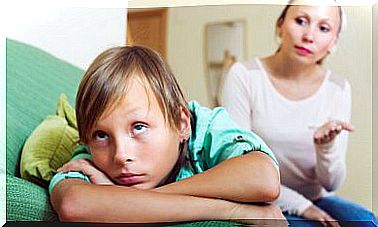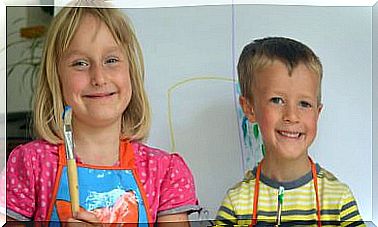Indecisive Children, How To Help Them?

We could say that, during childhood, it is normal not to know what to do or what to decide. However, as parents we must help children and encourage them to form their own opinions on different topics. In the following article, we will tell you how to act around indecisive children.
Indecision in children
That children under the age of six are indecisive is a very frequent reality. They may debate between choosing one food or another, between one toy or another … Perhaps they first order toast for breakfast and, when they see their brother or parents eating cereals, they want to too. It is not a question of envy or of ‘having the other’s’, but of indecision.
Adults consult doctors on this subject and also their friends who once had undecided children. The most normal response is usually: “But it is the most normal thing in the world!”
This is because at that age they are still developing their personality, their individuality and their sense of themselves. This means that they do not know what they want and must experience everything.
First he will say yes to something that his parents usually choose, but later he will realize that he would like something else. He is still too young to know whether a decision is correct or not; that’s what adults should be aware of.
Indecisive children are not ‘picky’ nor do they have any behavior problems. They are also not undisciplined or seek the attention of mom or dad. They just don’t know what to decide because they haven’t experienced all the variables yet.
How to help undecided children
The first step in helping undecided children has to do with understanding the situation; In other words, it must be taken into account that, when we are little, it is difficult for us to decide even on the most insignificant or everyday things.
However, that does not mean that we will let our children spend half an hour in front of the ice cream parlor choosing what kind of ice cream they want to drink and neither that, as parents, we will insist and ask them to hurry because there are many people waiting for their turn.

Is it possible to reach a middle ground? Yes of course. The best way to help you is to allow you to express your opinion and your likes at any time. For example, if we are on the way to school, let her tell us what clothes she likes to wear or what color is her favorite — she will surely change it periodically.
Another way to help you is to narrow down the options to decide. If you have a wide range of alternatives at your disposal, you are more likely to spend some time and remain undecided. So instead of asking what do you want to eat? You can say: “Today there is pasta or hamburgers, what do you prefer?”
In addition, it is advisable that you foster confidence in your little one. To do this, don’t make decisions for him just because you’re in a hurry. In the example of the ice cream parlor, it would be that since the child does not confirm what taste he wants, you tell the clerk to put chocolate and strawberry ‘because they are his favorites’.
This, instead of doing the little one a favor, is hurting him, since he will feel that he cannot make decisions for himself and that no matter what he says, his mother or father will end up choosing for him.
At an early age, this can be detrimental to your personality development. In the future, you may become less autonomous and increasingly difficult to make decisions.

Should the children decide everything?
Now, a very common question for parents of undecided children is: What options can I give you to decide? Of course, you cannot ask a five-year-old child fundamental or obligatory things in life, such as which school to go to or whether or not he will eat vegetables and fruits. That is not debatable at a child level and you have to be very strict about it.
However, perhaps you can make her choose between two or three clothes to go on a walk or which toy from a couple of options she wants to take on a beach vacation.
Indecisive children go through this stage better if they have the support of their parents, their patience and, above all, their affection. It is essential that adults encourage children to make their decisions. Even if they are ‘details’ or ‘trifles’ for them, it will be a great achievement and will allow them to increase their self-esteem.










